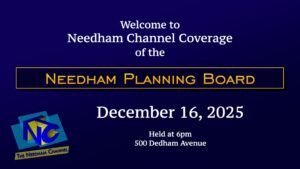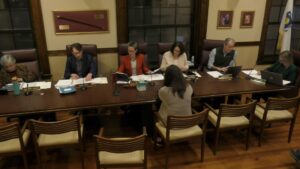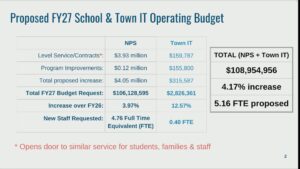July 6, 2023
• Is Needham facing a problem with parking in the Town Center and Needham Heights? Depends on who you ask. But a study suggests it’s not as bad as you may think.
story by Yuxiao Yuan
As the Town of Needham continues to grow, vehicles have become a huge consideration when new businesses and residences are proposed. One of the first questions they are asked is what they’re going to do for parking. The Town of Needham recently conducted a comprehensive parking study of Needham Center and Needham Heights. They’re seeking to optimize the use of existing public parking spaces and to make it easier for visitors to find and pay for parking. Do you often find downtown parking insufficient? Well, the parking occupancy analysis carried out by consulting company, Stantec paints a different picture. It shows during peak hours, only 60 to 75% of parking spaces in Needham Center are occupied, while Needham Heights has a 50% occupancy rate. Amy Haelsen, as the town’s Economic Development Manager, led the effort to get public input for the parking study. She said that the town, based on the conclusions of that study, can begin implementing some basic improvements. “Oftentimes, there is readily available parking with a short distance, but it might not be visible to exactly where you are.” says Haelsen. “So, what we have come to realize is that we need to make some improvements to some very basic things. For example, way-finding signage. If you’re not from Needham and you’ve never been here before, it’s not going to be an instinct as to where to find the parking. So, if we do a better job of improving the parking and the way-finding signage, we can direct people to areas to park.” Haelsen highlighted a frequently overlooked parking lot on Dedham Avenue. Not only does the space lack clear signage, but people also find it less accessible to their destinations. One potential solution is to collaborate with neighboring businesses and provide access through their space. “If you take down a fence, for example, it allows people to cut through. It might be just, you know, a private parking lot, but it’s a parking lot [that allows them] to get to their destination.” “So, one example might be if somebody wanted to park in the Dedham Avenue lot and go pick up a pizza at Needham House of Pizza on Great Plain Avenue. They could park in that lot and walk behind the building, and then there’s actually an alleyway that they could cut over to Great Plain Avenue, as opposed to having to park on Dedham Avenue and walking all the way up Dedham Avenue and then taking a right on Great Plain Avenue and going down four or five storefronts. If you make it easier for people to access their destinations, they are willing to park further.” Another recommendation is to introduce long-term parking options, allowing visitors to park more than two hours. Currently only local employees with permits are able to park for extended periods. Haelsen points out,”If you wanted to come [for] an appointment at a local salon, you wanted to grab lunch and then maybe do some browsing around, that’s going to take more than two hours. Well, right now, the meters on the street only allow for two hour parking as do the lots. So, if there was an area that had longer term parking, you know, an area not only for employees, but an area for folks who wanted to stay more than two hours, that would help solve that problem.” In addition, the study compared parking fees in Needham with those in neighboring towns. The findings show, unlike other communities which charge tiered rates for different parking areas, Needham utilizes a lower flat fee that does not align with the demand. According to Haelsen, “One of the recommendations they made was parking spaces closer to the epicenter of Needham Center should be a higher price than spots that are further away on Great Plain Avenue.” She continued to caution “Municipalities don’t perceive parking and charging for parking as a way to bring in revenue for the town. A town charges for parking to promote turnover. Any misperception that folks might have, thinking that the town is looking to increase parking meter costs to increase revenue is not accurate.” The study also proposes upgrading the existing coin-based meters across the town and exploring alternative payment methods such as pay by phone technologies in the long run. The study also suggests, in the long run, the town should reassess its parking requirements for commercial establishments in Needham Center and in Needham Heights. Currently, projects often seek parking relief during the permitting process. “So it begs the question, if developers and applicants are consistently seeking relief, then maybe the requirements, to begin with, are too high. And the consultant actually came back with that data and said, as compared to other municipalities, Needham’s actually requiring more parking than it actually really needs.” This study also serves to inform the Downtown Streetscape Project, which aims to enhance safety and aesthetics in Needham Center. As the project moves into the next phase, knowledge of the parking inventory will enable town officials to make informed decisions regarding potential changes like adding bike lanes. However, it’s important to know that all of these recommendations are not yet set in stone. Haelsen encourages interested individuals to stay informed about future plans by monitoring Select Board meetings and participating in public hearings, where residents would have the opportunity to share their own opinions.
• Is Needham facing a problem with parking in the Town Center and Needham Heights? Depends on who you ask. But a study suggests it’s not as bad as you may think.
As the Town of Needham continues to grow, vehicles have become a huge consideration when new businesses and residences are proposed. One of the first questions they are asked is what they’re going to do for parking. The Town of Needham recently conducted a comprehensive parking study of Needham Center and Needham Heights. They’re seeking to optimize the use of existing public parking spaces and to make it easier for visitors to find and pay for parking. Do you often find downtown parking insufficient? Well, the parking occupancy analysis carried out by consulting company, Stantec paints a different picture. It shows during peak hours, only 60 to 75% of parking spaces in Needham Center are occupied, while Needham Heights has a 50% occupancy rate. Amy Haelsen, as the town’s Economic Development Manager, led the effort to get public input for the parking study. She said that the town, based on the conclusions of that study, can begin implementing some basic improvements. “Oftentimes, there is readily available parking with a short distance, but it might not be visible to exactly where you are.” says Haelsen. “So, what we have come to realize is that we need to make some improvements to some very basic things. For example, way-finding signage. If you’re not from Needham and you’ve never been here before, it’s not going to be an instinct as to where to find the parking. So, if we do a better job of improving the parking and the way-finding signage, we can direct people to areas to park.” Haelsen highlighted a frequently overlooked parking lot on Dedham Avenue. Not only does the space lack clear signage, but people also find it less accessible to their destinations. One potential solution is to collaborate with neighboring businesses and provide access through their space. “If you take down a fence, for example, it allows people to cut through. It might be just, you know, a private parking lot, but it’s a parking lot [that allows them] to get to their destination.” “So, one example might be if somebody wanted to park in the Dedham Avenue lot and go pick up a pizza at Needham House of Pizza on Great Plain Avenue. They could park in that lot and walk behind the building, and then there’s actually an alleyway that they could cut over to Great Plain Avenue, as opposed to having to park on Dedham Avenue and walking all the way up Dedham Avenue and then taking a right on Great Plain Avenue and going down four or five storefronts. If you make it easier for people to access their destinations, they are willing to park further.” Another recommendation is to introduce long-term parking options, allowing visitors to park more than two hours. Currently only local employees with permits are able to park for extended periods. Haelsen points out,”If you wanted to come [for] an appointment at a local salon, you wanted to grab lunch and then maybe do some browsing around, that’s going to take more than two hours. Well, right now, the meters on the street only allow for two hour parking as do the lots. So, if there was an area that had longer term parking, you know, an area not only for employees, but an area for folks who wanted to stay more than two hours, that would help solve that problem.” In addition, the study compared parking fees in Needham with those in neighboring towns. The findings show, unlike other communities which charge tiered rates for different parking areas, Needham utilizes a lower flat fee that does not align with the demand. According to Haelsen, “One of the recommendations they made was parking spaces closer to the epicenter of Needham Center should be a higher price than spots that are further away on Great Plain Avenue.” She continued to caution “Municipalities don’t perceive parking and charging for parking as a way to bring in revenue for the town. A town charges for parking to promote turnover. Any misperception that folks might have, thinking that the town is looking to increase parking meter costs to increase revenue is not accurate.” The study also proposes upgrading the existing coin-based meters across the town and exploring alternative payment methods such as pay by phone technologies in the long run. The study also suggests, in the long run, the town should reassess its parking requirements for commercial establishments in Needham Center and in Needham Heights. Currently, projects often seek parking relief during the permitting process. “So it begs the question, if developers and applicants are consistently seeking relief, then maybe the requirements, to begin with, are too high. And the consultant actually came back with that data and said, as compared to other municipalities, Needham’s actually requiring more parking than it actually really needs.” This study also serves to inform the Downtown Streetscape Project, which aims to enhance safety and aesthetics in Needham Center. As the project moves into the next phase, knowledge of the parking inventory will enable town officials to make informed decisions regarding potential changes like adding bike lanes. However, it’s important to know that all of these recommendations are not yet set in stone. Haelsen encourages interested individuals to stay informed about future plans by monitoring Select Board meetings and participating in public hearings, where residents would have the opportunity to share their own opinions.





More Stories
ZBA Deliberates Tight Fit on Chestnut Street
Envision Needham Finds Resistance
Needham Open Studios Turns 25